After 13 years, it's time for United Nations soldiers in Haiti to leave, Secretary-General Antonio Guterres said in a report to the U.N. Security Council this past week.
Guterres said the operation in Haiti should close by Oct. 15. The report with Guterres' recommendation was obtained by the Miami Herald.
"The military component should undergo a staggered but complete withdrawal of the 2,370 personnel," Guterres said of the U.N. Stabilization Mission in Haiti, which is more commonly known by its French acronym, Minustah.
As part of the phasing out of Minustah, Guterres recommended that the $346 million mission "be extended for a final period of six months" after its current mandate expires April 15. The U.N. Security Council is expected to debate Guterres' recommendations - including the future role of the United Nations in Haiti -April 11.
While Security Council members all agree on the withdrawal, there is disagreement on the future of the U.N.'s presence in Haiti. Guterres recommended that a smaller mission replace Minustah to focus on police development and the country's dysfunctional judiciary.
Last month, U.N. Undersecretary General for Peacekeeping Operations Herve Ladsous visited Haiti and said "the military component is not necessary anymore." Guterres agrees.
But the last time the U.N. attempted to leave Haiti, an armed revolt forced the deployment of more than 6,000 troops. This time, Guterres said, the proposed withdrawal should be "gradual" to give the Haiti National Police time to take responsibility for the country's security.
Guterres said the new mission also would be mandated to help strengthen human rights in Haiti. It would still maintain a political section, while the number of civilian employees would be reduced by 50 percent. Meanwhile, the U.N. foreign police presence also would be reduced, deployed only to five regions to provide back-up to Haiti National Police.
Overall, the number of foreign police officers in Haiti would be reduced from 1,001 to 295. They would be charged with mentoring and offering strategic advice to senior-level Haiti National Police officers.
Foreign diplomats acknowledge that the Haiti police force has made great strides - it was key in the recent arrest of alleged drug trafficking fugitive Guy Philippe - but Guterres said it "has yet to build adequate capacity to address all instability threats inside the country, independently of an international uniformed presence and in line with human rights standards."
Haiti's "long-standing risks of instability caused by a combination of a culture of zero-sum politics, deep-rooted political polarization and mistrust, poor socio-economic and humanitarian conditions as well as weak rule of law institutions and serious human rights challenges," suggests the need for continued support for the national police, Guterres said, especially in gang-ridden metropolitan Port-au-Prince, and in the southern and northern region where police presence remains low.
"Haiti is still in a delicate period of political transition, pending the formation of the new government and the definition of its governance priorities," he said.
On Thursday, Haiti's Senate approved the policy statement of recently designated Prime Minister Jack Lafontant. Lafontant, who lacks political experience and has made promised to turn around the country's fortunes, still must get the approval of the Lower Chamber of Deputies. He and his Cabinet are expected to go before the body on Monday.
The new government's lack of political experience is not the only challenge facing Haiti, which has seen a steep decline in foreign aid since its devastating Jan. 12, 2010, earthquake, and the suspension of some budgetary support from donors after a fraud-marred 2015 presidential election led to an interim government.

